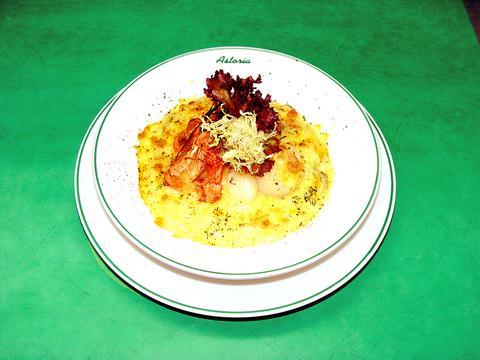A good restaurant feeds the body, but a great restaurant feeds the soul, transporting it to another place or time. The Astoria in Taipei's Wuchang Street is like a portal that takes diners back in time to 1949, to the kind of respectable cafe our Western grandmothers dressed up to lunch at. It provides a feast for the senses with its classic recipes, as well as a few new surprises.
The Astoria was reopened in July by the same family that has kept the bakery downstairs going for 55 years, to the delight of the culturati who had made the place their second home (and like family, patriarch Archiybold Chien fed some of the writers and artists in their lean years). One booth has photos of its longtime literary denizens.

PHOTO COURTESY OF THE ASTORIA
But the food stands up to the challenge of recreating a past. Four salads are offered in the mid-NT$200 price range, including a chef's salad, Russian, Caesar and fruit. The Caesar was satisfying, served with four helmeted but naked prawns. The tiny croutons, bacon and romaine were all perfectly crisp, with a dressing more sweet than redolent of garlic and anchovy.
The smoked salmon spaghetti turned out to be a handsomely made plate of fettucine topped with a wide slice of smoked salmon. Underneath were chunks of fresh salmon in a cream sauce, with a rainbow of delicately julienned peppers and onions.
The "course" menu offers fried meats and seafoods for NT$280 to NT$350. Specials (found not on the menu but on a tabletop card in Chinese only) top the price range with steak and lamb, both NT$580. They also include beef cooked in red wine for NT$380 and something that was described to me as "pancakes with cheese and vegetables" for NT$300.
This turned out to be a surprise -- a large plateful of quesadillas, served with a creamy sauce (that wasn't sour cream) and sweet salsa heady with oregano but lacking the usual smoky cumin. A slight afterburn comes from the canned jalapenos in the lighter-than-tortilla crepes, filled with chicken, cheese and julienned vegetables. You're not in the 1950s anymore. Rounding out the offerings are numerous varieties of coffee, the bakery's pastries and fruit frappes.
This is the place to take your visiting family when they've tired of noisy Chinese restaurants and want to catch their breath.

As Taiwan’s second most populous city, Taichung looms large in the electoral map. Taiwanese political commentators describe it — along with neighboring Changhua County — as Taiwan’s “swing states” (搖擺州), which is a curious direct borrowing from American election terminology. In the early post-Martial Law era, Taichung was referred to as a “desert of democracy” because while the Democratic Progressive Party (DPP) was winning elections in the north and south, Taichung remained staunchly loyal to the Chinese Nationalist Party (KMT). That changed over time, but in both Changhua and Taichung, the DPP still suffers from a “one-term curse,” with the

Jan. 26 to Feb. 1 Nearly 90 years after it was last recorded, the Basay language was taught in a classroom for the first time in September last year. Over the following three months, students learned its sounds along with the customs and folktales of the Ketagalan people, who once spoke it across northern Taiwan. Although each Ketagalan settlement had its own language, Basay functioned as a common trade language. By the late 19th century, it had largely fallen out of daily use as speakers shifted to Hoklo (commonly known as Taiwanese), surviving only in fragments remembered by the elderly. In

William Liu (劉家君) moved to Kaohsiung from Nantou to live with his boyfriend Reg Hong (洪嘉佑). “In Nantou, people do not support gay rights at all and never even talk about it. Living here made me optimistic and made me realize how much I can express myself,” Liu tells the Taipei Times. Hong and his friend Cony Hsieh (謝昀希) are both active in several LGBT groups and organizations in Kaohsiung. They were among the people behind the city’s 16th Pride event in November last year, which gathered over 35,000 people. Along with others, they clearly see Kaohsiung as the nexus of LGBT rights.

In the American west, “it is said, water flows upwards towards money,” wrote Marc Reisner in one of the most compelling books on public policy ever written, Cadillac Desert. As Americans failed to overcome the West’s water scarcity with hard work and private capital, the Federal government came to the rescue. As Reisner describes: “the American West quietly became the first and most durable example of the modern welfare state.” In Taiwan, the money toward which water flows upwards is the high tech industry, particularly the chip powerhouse Taiwan Semiconductor Manufacturing Co (TSMC, 台積電). Typically articles on TSMC’s water demand